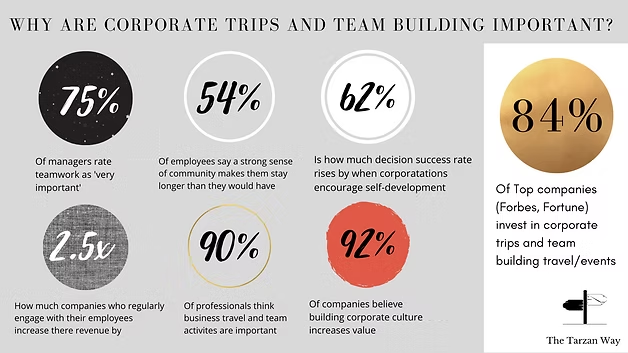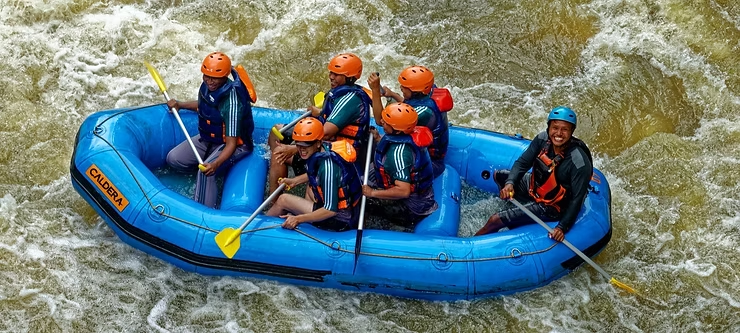Corporate travel, especially corporate travel in India, is underrated, less invested in, and often ignored because of the lack of benefits that many managers and companies see, although there are multiple. There are many benefits of corporate travel – leadership development, team bonding, self-development, and many more.
In life and in business, if you want to go fast, go alone. If you want to go far, go together. Teams should be able to act with the same unity of purpose and focus as a well motivated individual.
Bill Gates
We know that there are many questions related to corporate trips and team-based travel, such as what are corporate trips, is corporate travel expensive, corporate travel trends, the importance of corporate travel, etc. There are multiple alternatives when it comes to corporate travel – you can hire an agent, a travel agency, self plan a trip, or have an in-house HR/front desk employee taking up a relatively new positing now popular in companies as a corporate travel manager.

So why is corporate travel and taking group trips so important? We know that in these times of coronavirus and the pandemic it’s really hard to think of travel – but from a business perspective, the investment is well worth the time. Corporate trips, post-COVID-19, will be even more important than before after months of working from home and no office/personal interaction. The future of travel is uncertain, but a corporate trip/business travel post-COVID-19 is going to be extremely essential. Stressful times call for fixes in motivation, and corporate travel is just as important for improving employees’ psychological state as it is for company culture and improved productivity. So why exactly is a corporate trip so important?
Self-understanding and self-development

One of the keys to better corporate culture and a strong bond between employees, managers, and executives of a firm, is to consider each employee in equal regard in terms of the importance of their self-development and mental safety/satisfaction. When employees are treated as long term family instead of short term replaceable assets, there is not only an increase in productivity and loyalty towards work but also a long-standing idea of the goodwill of a company that sustains through and even after their term with you.
The first step to this is an emphasis on self-understanding for the furthering of everyone’s mutual targets and goals. Self-understanding involves the usage of simple activities, conversations, time off, etc. that furthers the person’s understanding of who they are and their ultimate goals. A company should always promote this, both for the development of an employee and to place itself in higher regard in an employee’s mind. Travel plays a huge part in this – corporate trips allow employees to reflect on what it is they are working towards, the role they play in a company, their ultimate opinion of it, and how they can utilize their time and efforts best to impact everyone’s lives and time as well. It is easy to get into the rat race, but to stop and think is a luxury often very few can take – a company should make corporate trips and team bonding a part of the culture so that there is higher retention and people in the company understand themselves, and therefore their contribution, better. Plan for trips that place an emphasis on doing menial tasks that allow for deeper thinking and conversations between all departments and levels of employees to encourage deeper self-understanding and development.
Check out this blog by the Life-long Learner on self-improvement over a lifetime for a better understanding of the process and effort behind it. Travel definitely encourages self-development, and there are detailed articles and many blogs, such as this one by the Worldpackers, that emphasize on it!
Travel is a stress buster

The Tarzan Way has hosted more than 1,100 travelers and in our lengthy experience, we’ve seen people travel for many reasons, but all agree that travel makes them happy, content, and see the big picture of life. Your executives, managers, and employees may not be passionate travelers, but it is undeniable that going far from normal life and to a relaxed setting can monumentally help stress and large workloads. Keep in mind that travel isn’t an escape or respite from that workload, but a more slowed downtime that allows for employees to gain perspective over the usual race for success. This is extremely helpful to reduce stress and combat anxiety and other mental health problems your employees may be facing (and often don’t tell their managers about). It also allows them to return to their jobs energized, motivated, productive and having a better, clearer picture of where their focus should be and currently is.
Corporate trips, no matter how short they are, are focused on building rapport, improving on relations, and doing exercises/simple activities that can reduce stress, which can negatively impact work in a corporate setting and lead to major problems for employees. Companies have a responsibility towards their employees (no matter their rank and status) to treat them passionately, with empathy and understanding, and keep in mind their sufferings or situations. An article by Forbes supports this claim, and if you want destination ideas or more inspiration on planning a trip – check out The Wandering Soul’s Wander Tales’ blog on leaving stress behind in a beautiful destination that will surely inspire you and convince you of the benefits of corporate trips.
Teams understand each other better

We know you’ve heard this before, but this is something essential – team bonding is extremely important for the team to function smoothly and issues dealt with well and smoothly. Corporate trips can be focused on particular teams as well as the company as a whole – you can achieve this by incorporating different activities, be it an adventure /physical session, reflective sessions, calming group activities like yoga or painting, and even simple evening game periods that concentrate on playing as a team, understanding each other’s strengths and weaknesses. Many innovative corporate travel packages incorporate fun activities like rafting, pitching teams against each other, ziplining/adventure sports in teams, etc. There are many benefits of corporate trips in terms of team building and bonding – research and articles, such as this one by Inteletravel, support this.
Why is it so important for teams to understand each other and bond? It isn’t just about knowing one another well for the purpose of working and adapting to all circumstances, but also recognizing who is better for what position or work and how managers/co-workers should treat each other and talk with each other. Communication, workload, and task management depend heavily on personality and the specific characteristics of employees. Traveling and bonding as a team is one of the most important ways to bring out the team spirit and honesty within a team setting.
Try finding new, different, and unique ways to travel for corporate trips, such as caravans, rented villas, boathouse, etc. that can also solve social distancing and sanitization problems. Check out Travel See Write’s blog on Kerela’s backwaters and the less explored Munroe island for some inspiration!
Relaxed settings bring out honest feedback

When people feel comfortable, honest thoughts and opinions usually emerge in conversation, and corporate employees are no different. In fact, due to a restrained, formal, and often autocratic office atmosphere that encourages discipline and timeliness but suppresses creativity and honesty, this show of opinion is extremely important and often rare – especially when it comes to opinions being said about those in higher status or to more high-level employees/executives. Corporate trips are the one thing that suspends all forms of organizational barriers to communication, making honesty all the more apparent.
The relaxed environment in itself makes feedback more apparent and voiced out, but one thing companies can do is have activities for teams and departments that involve them working together and having to solve problems by understanding one another – that kind of atmosphere encourages honesty and real feedback within the setting, and although the circumstance might be temporary, it builds the setting and openness for further open communication. Feedback is essential to improvement, and through well-planned activities and corporate trips, companies can easily make sure both that the high-level managers and lower-level employees have an equal playing feed and receive feedback honestly and openly that sets the base for further rapport. Regular criticism grounds employees and emphasizes on the role of feedback for superiors.
There are many activities you can plan for, and even select offbeat, unique destinations and ways to travel for a different corporate experience and new settings for the teams to interact and be together in a way they don’t get to in the corporate environment. Travelure has a great feed focusing on great Indian destinations that can inspire you for selecting one!
Creating a feeling of motivation and appreciation

In the age of millennials and increased expectations from employers, hiring and retaining the best employees requires more investment of both time and effort now than it did before. One essential part of this is corporate travel because it is viewed as a prospect of growth and development far from office settings. Gratuity, company perks, and good insurance are just some of the factors that good employers make sure they offer, but the best ones need something to top that, just like Google’s excellent work environment and complete organizational openness that makes it the best company to work in.
So why are corporate trips so important in this sense? because these trips and team bonding exercises prove to employees that this isn’t just another organization, and it isn’t just another 9 to 5. Trips prove appreciation – they are a loud message to employees, both current and prospects, that this is a company that will appreciate each employee, see them singularly, make efforts to motivate them, and above all, recognize their talents, fears, etc. outside of the scope of who they are identified as at work. Motivation in this sense is extremely important – to further this, try having activities that include both singular and group participation, so each employee can be separately focused on and motivated. One idea for this that has recently been gaining traction due to the fear of post-COVID-19 travel (and is now a glorified travel trend 2020) is road trips – they are easy to arrange, can cover a large variety of locations and activities, allow for social distancing and team bonding, and require less investment. Check out Wanderwink, a blog site with many posts on going on the road!
It’s important for corporations to also make sure everyone feels safe and secure even in new environments, so do check out Ravenous Legs – she has some great blogs on traveling as a solo woman and the safety tricks for the same that any company can learn and implement.
Inter-department socialization

Office settings don’t allow for something that is essential within corporations – departments socializing and working together on things that don’t center around normal work. Often there are departments completely removed from each other or with less interaction, and this is something companies have to move to fix. Why is inter-departmental socialization important? it obviously does affect how team members interact with each other from different departments but also helps managers identify which members work best/worst with different departments, some may have a knack for working in another department, and others yet will show leadership promise in terms of merging together and effectively communicating between departments. Collaboration between different departments makes members work towards a common goal, develop leadership skills, learn each other’s strengths and weaknesses, and participate in character-building activities.
Now that we’ve established that interdepartmental socialization is very important, let’s get into how you can promote and support this. Plan for trips that make different departments interact more – try for caravan trips where you place different members from each team together in one caravan, try for adventurous activities like stranded in a forest and working towards a goal, etc. Check out our Caravan and Volunteer in Varanasi experiences for more inspiration and information – we have various other volunteering experiences too that can help and let members give back to the community while traveling.
Keep in mind that corporate trips will now have to be carefully planned and many aspects that may have been foreign first will be necessary now, for example, travel insurance. Read Rick Steeve’s guide to travel insurance for more detailed information, and the Ordinary Traveler‘s guide to traveling and keeping safe during and after COVID-19.
The importance of pushing comfort zones

Last but not the least, corporate trips and team bonding exercises allow for employees, managers, executives, to push their comfort zones and explore more of both themselves and their teammates, which is essential, especially since the formal, structured corporate environment doesn’t allow for creative adaptation and exploring new perspectives and activities. Comfort zones are good for mental safety and provide a good base to lean on, but there is no growth prospect or possibility to learn more from others within those comfort circles. Companies have to push people in their organization to try new things, both for the employee’s self-development and for more creative ideas and implementation of different things within the company.
Corporate trips can greatly help in this because they are a way to design activities, have sessions, and create conversation outside of a formal setting about things out of one’s comfort zone. Through trips, you can make shy employees group with unknown (to them) members from other departments, make fearful, always constrained employees to do adventure activities that can give them a mental push, design activities that are very creative – like murals and painting – for employees who do monotonous data or number based jobs for hours, etc. Pushing comfort zones is a test for both the ones doing the pushing and the ones being pushed. Managers can further test and developed their leadership abilities, and employees can realize within themselves potential they can use in their personal and professional lives. Read this great article by For Managers that talks about how stepping out of the circle of comfort is important for a manager and an employee in an organization structure.
All these points, when well applied, can impact an organization greatly – keep in mind every single tip that we’ve provided, and do your research dependant on where you’re going and what measures you can take!






